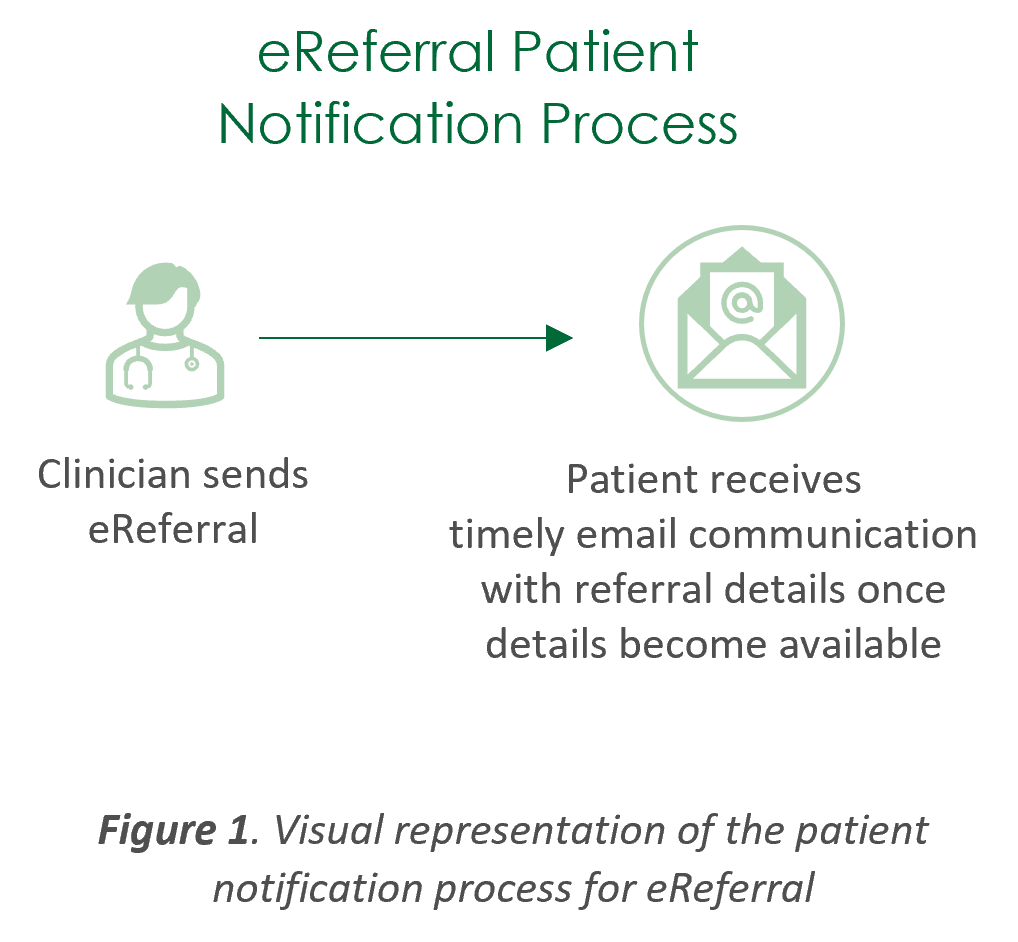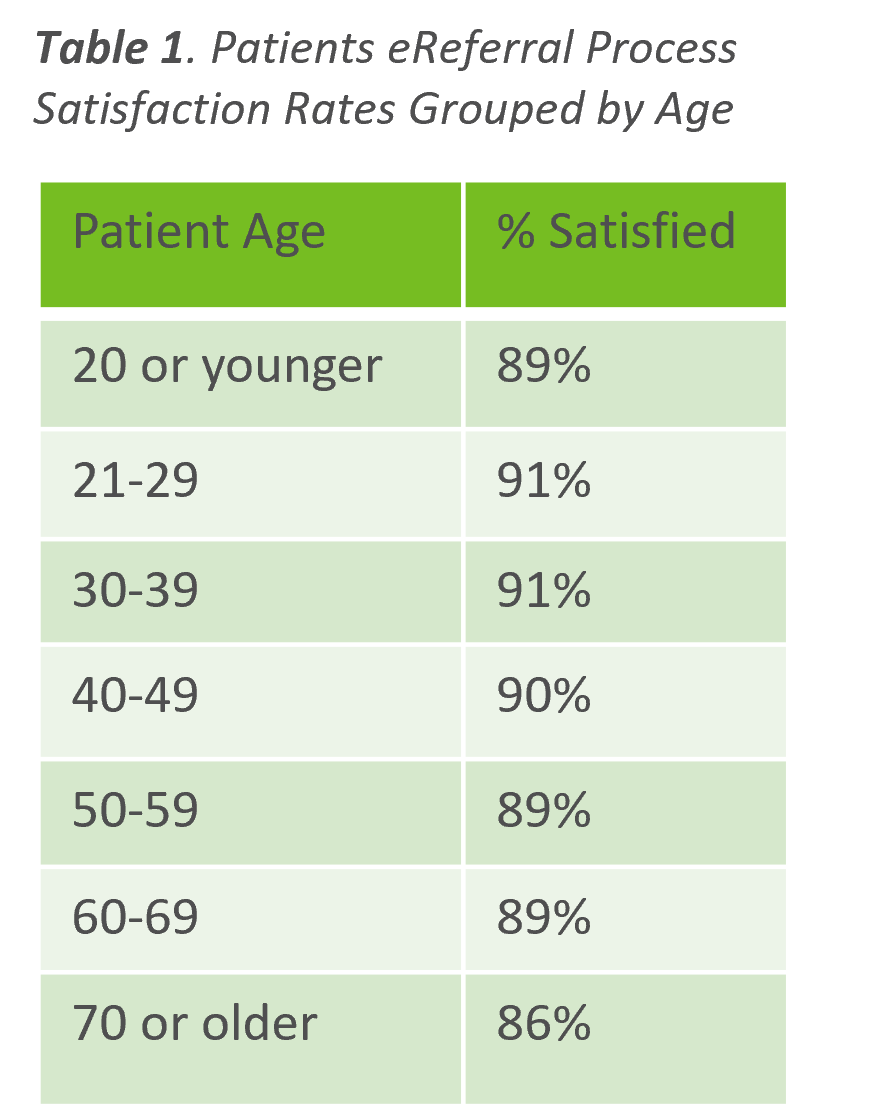Exploring the relationship between patient satisfaction and age with the eReferral process
Background
The rapidly growing population of older adults is increasingly adopting technology, challenging the misconception that they are either dissatisfied with or incapable of using it. Greenwald et al. described that many older adults have adoption rates of internet usage that are comparable to the general population, with online activities becoming a key part of their daily lives.1 Previous research indicated that adults 70 and older in their study reported high satisfaction in using health technology as part of their care, countering the belief that digital tools are only suitable for younger users.2

As connectivity becomes increasingly vital in all aspects of life, including healthcare, the role of technology in improving care efficiency, and outcomes for older adults is becoming increasingly important. eReferral’s ability to keep patients informed about their referral appointment details enhances connectivity and ensures patients remain engaged in their care. Figure 1 illustrates the eReferral patient notification process. The current findings with eReferral on patient satisfaction and age, supports the above findings that levels of satisfaction with health technology are not influenced by age. Older adults who use digital tools tend to view technology positively and actively integrate it into their daily lives.
Key takeaways
High Rates of Satisfaction with eReferral Process Found Among All Age Groups, including Older Adults
Patient Satisfaction with eReferral Process & Age

The electronic referral (eReferral) solution implemented across Ontario is designed to enhance communication between primary care clinicians and specialists, enabling quick and secure referrals to be sent and received via an electronic platform. When clinicians include a patient’s email address in the electronic referral, patients receive appointment details and status updates by email, the ability to confirm appointments online, and automated appointment reminders.
As part of the Ontario eServices Program, the eHealth Centre of Excellence (eCE) sends surveys to patients who have provided their email address and consented to receive eReferral notifications at the time their referral was sent. The survey includes demographic questions, such as age, and gathers feedback on overall satisfaction with the eReferral process amongst other topics.
An analysis of 145,866 patient surveys collected between January 2018 and September 2024 explored how age influences overall satisfaction with the eReferral process. Results shown in Table 1 revealed that satisfaction rates are consistently high across all age groups, ranging from 86% in the 70 or older age group (n=59,777) to 91% in the 21-29 (n=2,514) and 30-39 (n=6,295) age groups. This demonstrates that the eReferral process is well-received by patients, regardless of age. An effect size calculation (eta2 = 0.002) was performed after statistical significance was determined, however, this test resulted in a small effect size, indicating any effect of age on patient satisfaction was not clinically relevant for this study. The high satisfaction rates across all age groups could indicate that the eReferral process is suitable and sustainable for all age groups.
It is easier to refer back to the electronic information rather than trying to write everything down with a phone conversation.
Survey Respondent
Aged 60-69
For young people this would be extremely simple. For an older person like me, it was not bad. I am happy.
Survey Respondent
Aged 70+
As a senior I have difficulty with some sites. Yours is clear and straightforward. Thank you.
Survey Respondent
Aged 70+
Acknowledgements
The Ontario eServices Program delivers digital services (eConsult and eReferral are the
first initiatives in the scope of the program) that support clinical workflows and facilitate smoother transitions in care and an improved patient experience. The Ontario eServices Program is co-led by the Ontario eConsult Centre of Excellence (eConsult COE) and the eHealth Centre of Excellence (eCE) and is funded by Ontario Health.
1Greenwald, P., Stern, M. E., Clark, S., & Sharma, R. (2018). Older adults and technology: in telehealth, they may not be who you think they are. International Journal of Emergency Medicine, 11, 1-4.
2Land, L. P. W., Chenoweth, L., & Zhang, Y. G. (2022). Exploring adoption and satisfaction with self-service health technology in older age: Perspectives of healthcare professionals and older people. Healthcare, 10(4), 738. https://doi.org/10.3390/healthcare10040738
Interested in learning more?
Interested in partnering with us or learning more about
what we can offer you? Please reach out here.
Get the latest resources and insights
-
Spring 2025 Edition of the West Deployment Team Newsletter
Welcome to the Spring 2025 Edition of the West Deployment Team Newsletter for health professionals…
-

Prevention over reaction: Shield’s vision for cyber education in healthcare
In Canada’s digital healthcare ecosystem, cyber threats are no longer hypothetical, they’re happening now, and…
-

Patient Email Collection: A case study on collecting patient emails from a Family Health Team perspective
Secure email is one of the most common forms of communication today. In order to…
-

eReferral CoP Session #5
The eReferral Community of Practice (CoP) came together to collaboratively discuss how to establish and…